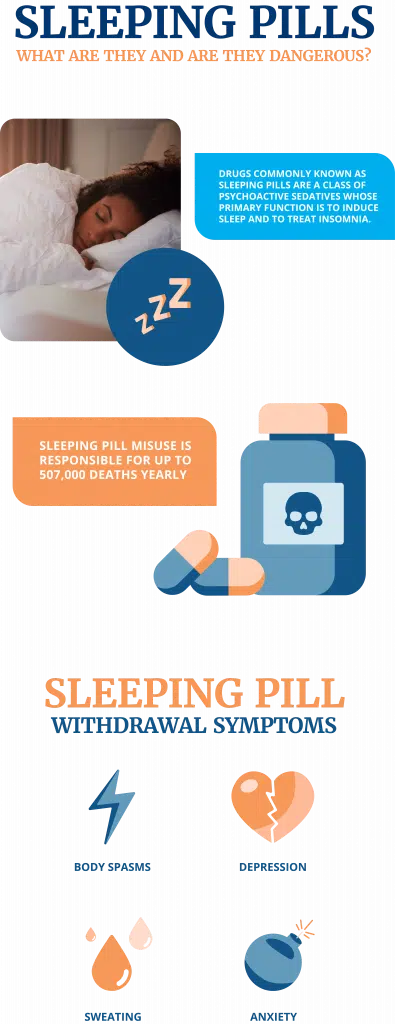Sleeping Pill Addiction
Although sleeping pills are not harmful when used as prescribed, when misused, they can be deadly. Unfortunately, many people do not take the dangers of sleeping pills seriously. As a result, many people start misusing sleeping pills. This high level of misuse caused sleeping pill-related ER visits to go from 22,000 in 2005 – 2006 to 42,000 in 2009 – 2010.
High levels of sleeping pill misuse are associated with 320,000 to 507,000 deaths each year. Sleeping pill addiction is also known to increase the rates of depression, which could then lead to suicide. Misuse of sleeping pills is even known to increase the chances of being in a car accident.
Also, sleeping pill addiction can lead to sleep apnea. Sleep apnea is a disorder in which a person’s breathing becomes shallow and starts and stops at different times while sleeping.
Sleep apnea can cause a person to have disturbed sleep. Going long periods of time with disturbed sleep often causes a person to develop serious heart problems.
You can even suffer from an addiction to over-the-counter sleeping pills. Like with prescription sleeping pills, addiction to over-the-counter sleeping pills can cause you to develop health issues like heart problems or respiratory depression.
Because of the dangerous health risks that sleeping pill addiction causes, sleeping pill addiction treatment is needed. The increasing rates of sleeping pill addiction also make it evident that sleeping pill addiction treatment is necessary.
Common Prescription Sleeping Pills
Zolpidem (Ambien)
One of the more well-known drugs used to help treat insomnia. Zolpidem is a sedative-hypnotic. Sedative-hypnotics are medications that have chemical substances in them that calm the brain while also inducing the brain to want to sleep. There are different types of Zolpidem medications that people can get a prescription to help them sleep. One of the most well-known brand names Zolpidem medications is Ambien.
Ambien is an immediate-release Zolpidem tablet that helps you fall asleep. Because it is an immediate-release tablet, though, Ambien is not great at keeping people asleep. To rectify this issue for Ambien users, Ambien CR was created. Ambien CR is an extended-release version of Ambien that helps people both fall asleep and stay asleep.
Ambien CR has two layers on it. The first layer dissolves immediately to help you fall asleep. The second layer then dissolves slowly to help you stay asleep.
People that take Zolpidem medications, such as Ambien or Ambien CR, shouldn’t drive for a while after taking the pill. You shouldn’t drive or do anything that requires you to stay alert for the entire day after taking long-acting Zolpidems like Ambien CR.
People that take Zolpidem should also not take it unless they have enough time to get a full night’s rest. Seven to eight hours is considered a full night’s rest.
To avoid dependency and addiction, do not take Zolpidem, like Ambien, for more than two weeks at a time. Other brand name forms of Zolpidem, outside of Ambien, include Edluar and Intermezzo.
Eszopiclone (Lunesta)
Like Zolpidem, Eszopiclone is a sedative-hypnotic. This means that Eszopiclone medications also slow and calm the brain down while inducing it into sleep. The one brand name version of Eszopiclone is Lunesta.
Lunesta is a great medication for helping people fall asleep and stay asleep. In fact, studies show that people who take Lunesta sleep an average of seven to eight hours a night. Like Ambien, you should not take Lunesta for more than two weeks at a time. In fact, the Food and Drug Administration (FDA) recommends that Lunesta not start at more than a 1-milligram dose. The FDA recommended this to avoid the risk of impairment and excessive grogginess the next day.
Zaleplon (Sonata)
Zaleplon is a sleeping pill drug used to help people fall asleep. The brand name version of Zaleplon is Sonata.
If you want a medication that will both help you fall asleep and stay asleep, Sonata is not the medication for you. One good thing about Zaleplon medications like Sonata, though, is that they only stay in your body’s system for a short amount of time. This means that you can still drive and do most normal activities the day after taking them.
On a physiological level, a Zaleplon, like Sonata, is hypnotic. A hypnotic is a sleep medication that targets parts of the center of your brain to make you fall asleep quickly.
Benzodiazepines
Benzodiazepines are insomnia medications that stay in your body’s system for longer periods of time. Because Benzodiazepines stay in your body’s system for so long, misusing them can very much lead to dependence or addiction.
One well-known form of a Benzodiazepine is Temazepam, which is represented in the brand name sleep medication Restoril. The other well-known form of Benzodiazepine is Triazolam. Triazolam is represented in the brand name sleep medication Halcion.
Do not use Benzodiazepines with opioids. Both benzodiazepine and opioids depress respiration and can thus, increase the risk of an overdose when combined.
Common Over-the-Counter Prescription Sleeping Pills
Melatonin
Melatonin is a hormone that regulates the sleep-wake cycle. The human brain naturally produces this hormone in its pineal gland. To help treat insomnia in a less habit-forming way, many people try taking over-the-counter melatonin supplement pills.
Because melatonin is a natural sleep aid, its side effects are milder than most other sleep aids. Still, people that misuse melatonin can develop a dependency and experience side effects like headaches and daytime sleepiness.
ZZZQuil
ZzzQuil is a diphenhydramine, or a sedating antihistamine. A regular antihistamine is a drug that treats allergies. Sedating antihistamines can help treat allergies while also helping you fall asleep.
ZzzQuil is specifically used as a sleep aid to reduce the amount of time it takes to fall asleep. Like many over-the-counter drugs, children under the age of twelve should not take ZzzQuil.
Benadryl
Benadryl is another diphenhydramine. This means that like ZzzQuil, Benadryl can simultaneously help you treat your allergies while also making you fall asleep easily. People also use Benadryl to treat common colds and itchy skin.
PMs
PMs are night-time forms of cold and flu over-the-counter medications. They help treat your cold or flu symptoms while also sedating your brain so that you can fall asleep. Examples of over-the-counter medications that have their own PM version include Tylenol, Advil, Aleve, etc. PMs are also typically diphenhydramine. Side effects of diphenhydramine can include dry mouth, blurred vision, daytime drowsiness, urinary retention, and constipation.
CONTACT US
Find out how we can help
Our compassionate counselors are standing by to answer any questions you may have. After helping thousands of people over the last 50 years, we have the resources to help you and your family and all your individual needs.
Why Sleeping Pills and Alcohol Don’t Mix
Sleeping pills and alcohol should not be mixed because the combination of the two could lead to death. This is because alcohol amplifies the sedating properties within sleeping pills and thus, increases the chances of an overdose.
Unfortunately, many people that suffer from a sleeping pill addiction purposely mix their sleeping pills with alcohol. They do this to intensify the effects of their sleeping pills. This deadly action taken by people is just one of the many reasons why sleeping pills addiction treatment is important to have.
Signs of Sleeping Pill Addiction
 There are numerous signs that you or a loved one may have a sleeping pill addiction. One example of a sign of sleeping pill addiction is attempting to quit using sleeping pills several times but not being able to. Sleeping pills are only intended to be used for a couple of weeks. Therefore, if you try to stop taking your sleeping pills but can’t, you should seek treatment.
There are numerous signs that you or a loved one may have a sleeping pill addiction. One example of a sign of sleeping pill addiction is attempting to quit using sleeping pills several times but not being able to. Sleeping pills are only intended to be used for a couple of weeks. Therefore, if you try to stop taking your sleeping pills but can’t, you should seek treatment.
Another sign of sleeping pill addiction is having cravings for sleeping medications. Craving sleeping medication is not normal. Thus, if you start to develop this trait, you likely have an addiction.
One key sign of a sleeping pill addiction is the willingness to do anything to get more sleeping pills. For example, someone suffering from a sleeping pill addiction may go to different doctor’s offices and pharmacies to get more refills on sleeping pill prescriptions.
Many people with sleeping pill addictions will continue taking the pills even though they are experiencing negative consequences. Some of these negative consequences could include passing out, having memory loss, losing your job, and more.
Symptoms of Sleeping Pill Addiction
Many symptoms of sleeping pill addiction are similar to the signs of sleeping pill addiction. For example, one symptom of a sleeping pill addiction is trying to quit but not being able to. Cravings for sleeping pills are also a common sign and symptom of a sleeping pill addiction.
Another symptom of a sleeping pill addiction is needing larger doses of sleeping pills to fall asleep. People that have a sleeping pill addiction may also start to isolate themselves from their family and friends. In fact, many people with a sleeping pill addiction are willing to neglect any family, personal, or professional obligations. A person with an addiction to sleeping pills may even start to exhibit mood swings and all-around hazardous behaviors.
Sleeping Pill Addiction Withdrawal Symptoms
A person with a sleeping pill addiction is physically and psychologically dependent on sleeping pills. As a result, when that person starts detoxing, he or she will experience withdrawal symptoms.
Examples of Sleeping Aid Addiction Withdrawal Symptoms Include:
- Body spasms
- Tremors
- Seizures
- Insomnia
- Delirium
- Anxiety
- Depression
- Irritability
- Confusion
- Hallucinations
- Cravings
- Sweating
- Increased heart rate
- Nausea
- Vomiting
Sleeping Pill Addiction Treatment
When going through sleeping pill addiction treatment, you will first need to go through medical detox. Medical detox will help those that are experiencing withdrawal symptoms.
Sleeping pill addiction treatment usually occurs through inpatient or outpatient care. Inpatient care is preferred for people that are trying to recover from a sleeping pill addiction. This is because it allows them to receive continuous medical and psychological observation and support.
Inpatient care will also give you more time to treat any co-occurring mental disorders that you may have. This is important because many people develop sleep issues as a result of a mental disorder like depression or anxiety.
Discovery Institute is Here For You
Regardless of where you are in your sleeping pill addiction, Discovery Institute is here to help. At Discovery, we have detox programs for all types of prescription drugs.
We also offer different individual and group therapy options, along with residential and intensive outpatient care. In other words, we’ve got you covered.
To learn more about Discovery Institute and the services that we provide, contact us today.
Discover
Your Potential
Finding a life of happiness and sobriety is possible. You are not alone! All you need to do is take the first step.

Dr. Joseph Ranieri D.O. earned his BS in Pharmacy at Temple University School of Pharmacy in 1981 and His Doctorate Degree in Osteopathic Medicine at the Philadelphia College of Osteopathic Medicine in 1991. He is Board Certified by the American Board of Family Medicine and a Diplomate of the American Board of Preventive Medicine Addiction Certification. Dr. Ranieri has lectured extensively to physicians, nurses, counselors and laypeople about the Disease of Addiction throughout New Jersey and Pennsylvania since 2012.



